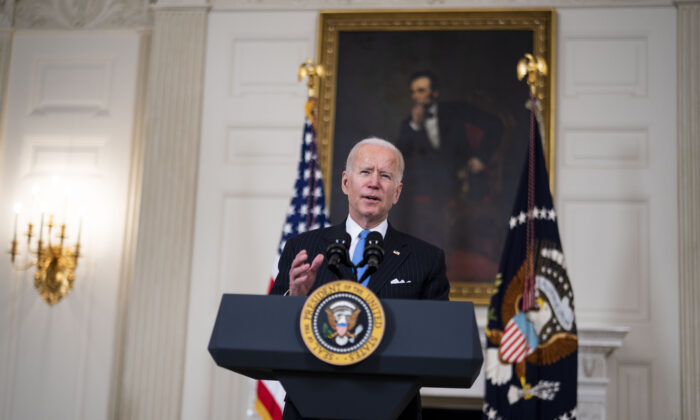
President Joe Biden speaks in the State Dining Room of the White House on March 2, 2021 in Washington, DC. (Doug Mills-Pool/Getty Images) China-US News
By Frank Fang March 4, 2021 Updated: March 4, 2021
The Biden administration’s approach to China as articulated in a speech by Secretary of State Antony Blinken on March 3 was heavy on rhetoric but light on substance, according to a foreign policy expert.
Blinken called China the “biggest geopolitical test of the 21st century, while also stating that the U.S. relationship with Beijing will be “competitive when it should be, collaborative when it can be, and adversarial when it must be.”
“The common denominator is the need to engage China from a position of strength,” Blinken added.
James Jay Carafano, vice president for foreign and defense policy studies at Washington-based think tank Heritage Foundation, told The Epoch Times that the speech was “the same old kind of empty rhetoric.”
He particularly criticized Blinken’s call for cooperation with China on certain issues.
“All the key vital issues that we have with China, we are on the opposite sides on all of them. So where are we going to cooperate?” Carafano said.
Carafano added that the concept of selective cooperation with China is a “failed decade-old construct.”
“It’s literally like Paul McCartney saying we’re gonna get the band back together and then somebody says, ‘Paul, you do know that two of the members are dead right’,” Carafano said.
For decades, U.S. administrations have engaged with the Chinese regime in the hopes that greater trade and investment links would lead to more democracy in the communist country. The Trump administration recognized this as a failed concept, and rewrote the United States’ approach to focus on confronting the regime over the threats it poses to national security, economic prosperity, and freedom.
Blinken’s words on working with China were reiterated in an interim national security strategic guidance issued by the Biden administration on Wednesday.
“We will welcome the Chinese government’s cooperation on issues such as climate change, global health security, arms control, and nonproliferation where our national fates are intertwined,” according to the guidance.
Gordon Chang, author of “The Coming Collapse of China” told The Epoch Times last month that it would not be possible for the United States to cooperate with the regime due to the conditions it imposes.
“The Communist Party has been very clear. They say that if you don’t cooperate with us on everything, we’re not going to cooperate on anything,” Chang said.
Critics have argued that the Biden administration has thus far announced policies that have benefited Beijing, including rejoining the Paris Climate accord, re-engaging with the United Nations Human Rights Council, rejoining the World Health Organization, and revoking a Trump-era rule relating to Beijing-funded Confucius Institutes.
Carafano said overall Blinken’s speech did not convey a coherent strategy.
“My assessment is: These guys came in without a plan. They don’t have a plan for China. They don’t have a plan for the Middle East. They don’t have a plan for Russia,” he said.
“We’re not seeing a clear policy of how you deal with great power competition of the 21st century.”
With reporting by Zachary Stieber. Cathy He also contributed to this report.







